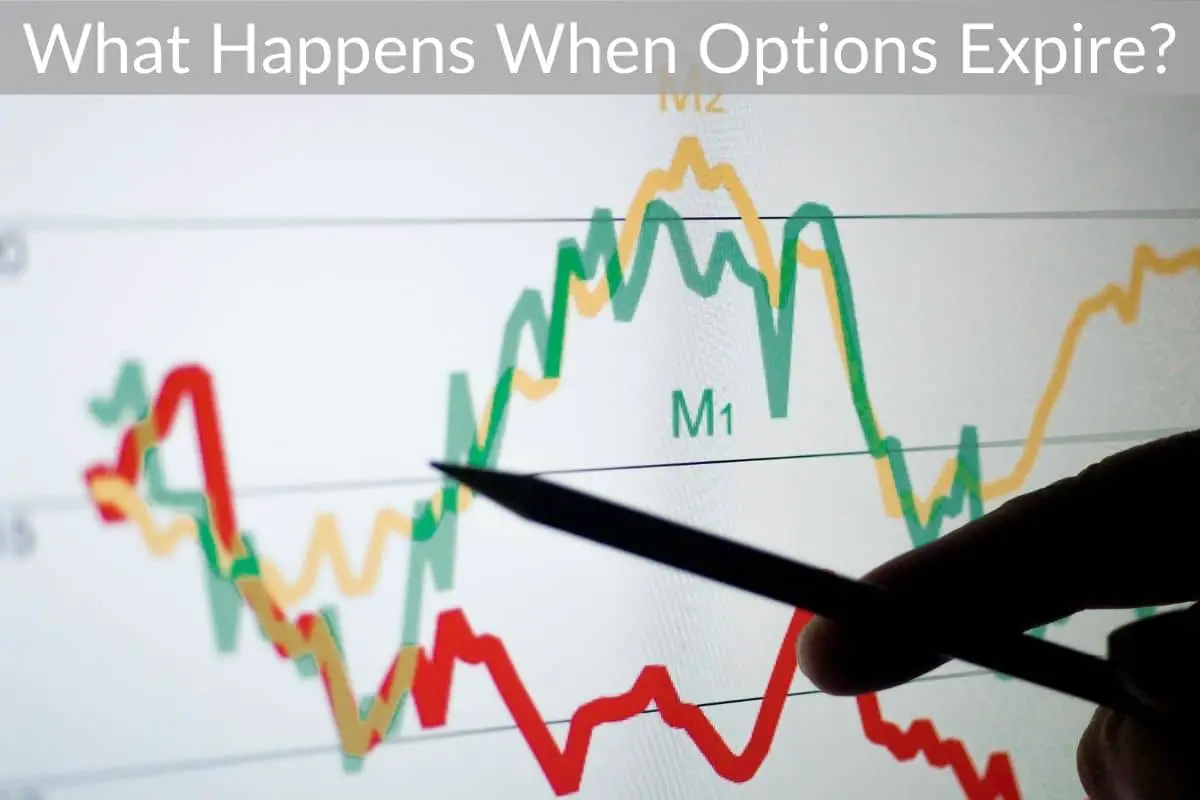Table of Contents
*This post may contain affiliate links. As an Amazon Associate we earn from qualifying purchases.
Options are financial instruments that give their owner the chance to buy or sell shares of an underlying asset for a defined price before or on the day of expiry of the contract. But what happens when the contract actually expires?
When options expire, they either become worthless or are automatically exercised or sold by your broker. What exactly happens depends on whether the option expired in the money or out of the money.
OTM options expire worthless, while most brokers will exercise or sell ITM options for their clients upon expiry if the clients don’t do anything.
For most investors selling the options that are in the money (ITM) is the best action as they won’t have the funds or won’t want to own the actual shares of stock. However, if an option is out of the money (OTM) then it will just expire worthless and disappear from the brokerage account.
In this article I will go into more detail about what happens when options expire in the money and when they expire out of the money. I will also explain what you should do when your options are getting close to the expiration date.
What Happens When Options Expire in the Money?
When an option is in the money (or ITM), it means that it holds intrinsic value. A call option is in the money when the strike price is lower than the asset’s market price, while a put option is in the money when the strike price is higher than the market price.
Two things can happen when an option expires ITM:
If you own a long call or put option, the broker will assume that by letting your ITM contract expire, you want to take delivery of the stock (or sell it in the case of a put) and will automatically exercise the contract for you. You will then be able to see the shares in your account (or removed from your account if you owned a put).
Some brokers however will automatically sell in the money puts or calls a certain period of time before the market closes if the investor doesn’t have enough money or shares in their account to covered exercising the call or put.
For example, Robinhood will automatically sell your put or call option 45 minutes before the market closes on the option’s expiration date if you don’t have money in your account to cover exercising the option. This is done to prevent you from losing out on all of your option’s intrinsic value if you happened to forget about it.
So if you want to control the sale of your option and you trade with Robinhood then you need to make sure to sell it prior to that time frame.
A long position in options is when you’re buying or holding an option, which gives you the right to buy or sell it for a certain price.
In the case of a short call or put option, once it expires ITM, you’ll go through the assignment process. The broker will once again assume that you want the shares to be assigned since you let the option expire ITM, so they will complete the assignment for you.
A short position is bearish and used when you expect the value of the option or its underlying asset to go in the opposite direction. A short position lets you sell or write options.
If your call or put option expires in the money, your broker will either automatically exercise or assign the option in accordance with the terms of the contract. However, you need to have enough money in your account to fulfill the exercise.
If you don’t have enough money or shares in your account the ITM option will typically be sold as I mentioned above.
For instance, if you have an option that lets you buy ABC stock for $10 per share, you would need $1,000 in your account since most contracts are for 100 shares of stock.
If you aren’t ready to make that type of commitment, make sure you understand your brokers’ policies on options that expire ITM. Some brokers will automatically exercise expiring options no questions asked.
You should communicate with your broker about this before buying any options and let them know how you would want them to handle your expiring ITM contracts.
Also, keep in mind that some brokers charge hefty exercise or assignment fees, so it would be
best to sell your option positions before or on the expiration date so they are not exercised.
What Happens When Options Expire Out of the Money?
It is a little more simple to understand what happens when options expire out of the money (or OTM). When an option is OTM, it means that it has no intrinsic value because the strike price is lower (higher for put options) than the market price.
This means you would lose money if you exercise that option.
When an option expires out of the money, nothing happens. Since the option is worthless when it expires, it ceases to exist and can no longer be seen in your account after a few days.
It’s a much simpler process than an option expiring in the money since no transactions happen, and you don’t have to do anything.
We can compare an expiring OTM option to car insurance. When you pay your monthly car insurance but don’t get into an accident for the whole year, the contract will simply expire with no exchanges.
The insurance company will keep the monthly premium you paid. With OTM options, the selling party of the option will keep the premium.
Vertical Spread Strategy
When it comes to expiring options, the vertical spread strategy is very common. This strategy involves buying or selling both a long and short call/put option of the same underlying asset and expiration date, but with a different strike price. The long position offsets the risk of the trade.
For example, let’s say you hold a short put option with a $50 strike and a long put option with a $47.5 strike. If the stock trades below both strikes and ends up at $47, then both puts would be in the money.
In this instance, you have an obligation to buy the 100 shares for $50. However, the long option helps you define the risk in that trade by subsequently permitting you to sell 100 shares for $47.5. While this trade will result in a loss, it won’t require you to own the shares.
For more information, Sky View Trading has a great in depth-video explaining the Vertical Spread Strategy. You can watch that below.
Once you’re comfortable with the vertical spread, there are more advanced strategies for you to research and consider, such as options gamma trading and long call butterfly spread.
Final Thoughts
Depending on whether an option expires ITM or OTM, upon expiration, the option will either become worthless and disappear from your account, or your broker will automatically exercise, assign, or sell the option and you will now hold the stock, sell the stock, or get your profits.
You need to make sure that you have enough money in your account for ITM expiring options. Otherwise, your broker won’t be able to complete the transaction and will often just sell the ITM options.
The vertical spread is a commonly used strategy to minimize risk with expiring options. It involves holding both a long and short position in options of the same asset but with different strike prices.

